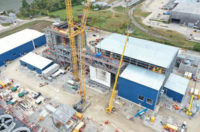Libya has revived its $100-billion housing infrastructure development program and re-contracted US firm AECOM Technology Corp. to manage its implementation and offer advice to the ministry of housing and utilities.
The revival of North Africa's region's largest home-building program by state-owned Housing and Infrastructure Board (HIB) come at a time when many foreign companies are returning to Libya. Many firms fled during the bloody revolution of 2011 that toppled strongman Muammar Gaddaffi. Companies are trooping back as the new government intensifies renegotiation of stalled contracts.
AECOM announced last week it has signed a $209-million contract with HIB to be the program manager for the $36-billion phase one of the housing construction project. Aecom had won a similar contract in 2008, which was suspended during the 2011 Arab Spring.
The US-based construction management firm returns to Libya six months after taking a lead role in the Libya Projects 2013 conference held in Tripoli, where James F. Thompson, AECOM chief executive of global programs, said: “We have thousands of contracts to enforce. Some are good. Some are a disaster.”
“In the past, we were constrained, [but] today, it is a whole new Libya. Libyans have been given the authority and the responsibility to drive these projects as we would do all over the rest of the world.”
Last June, Thompson promised that Aecom is determined to enforce “a consistent procurement system based on international best practice and have a contracting and procurement department once we are up and running in Libya.”
Housing projects worth $11 billion were under way in 2011 before the bloody regime change forced out contractors and stalled construction, according to HIB chairman Mahmoud Bashir Ajaj.
The program, as originally envisioned, called for construction of 200,000 new homes in Libya by 2020. The targets may have to be reset following the suspension of an estimated 300 projects worth $40 billion during the revolution.
In the first six months of 2013 HIB had signed at least least 90 new contracts for construction of 18,000 housing units, according Ajaj.
“This contract with AECOM reflects the significant commitment that Libya is making in re-establishing the development of our national housing and infrastructure program,” said Sharif.





